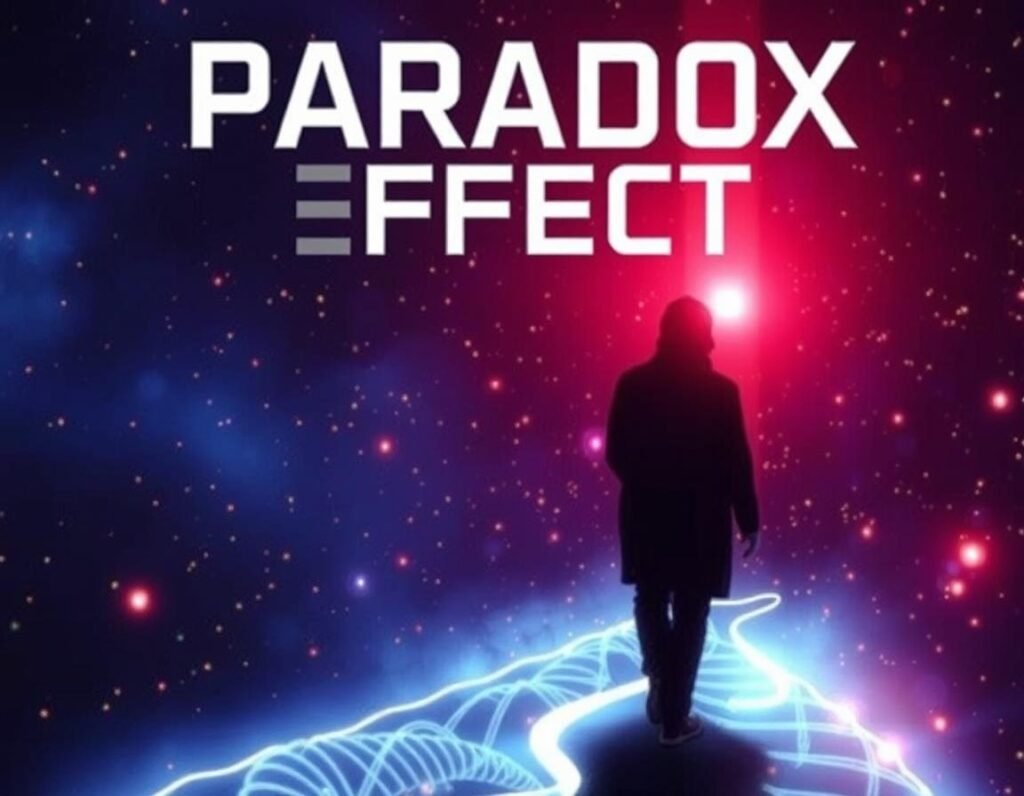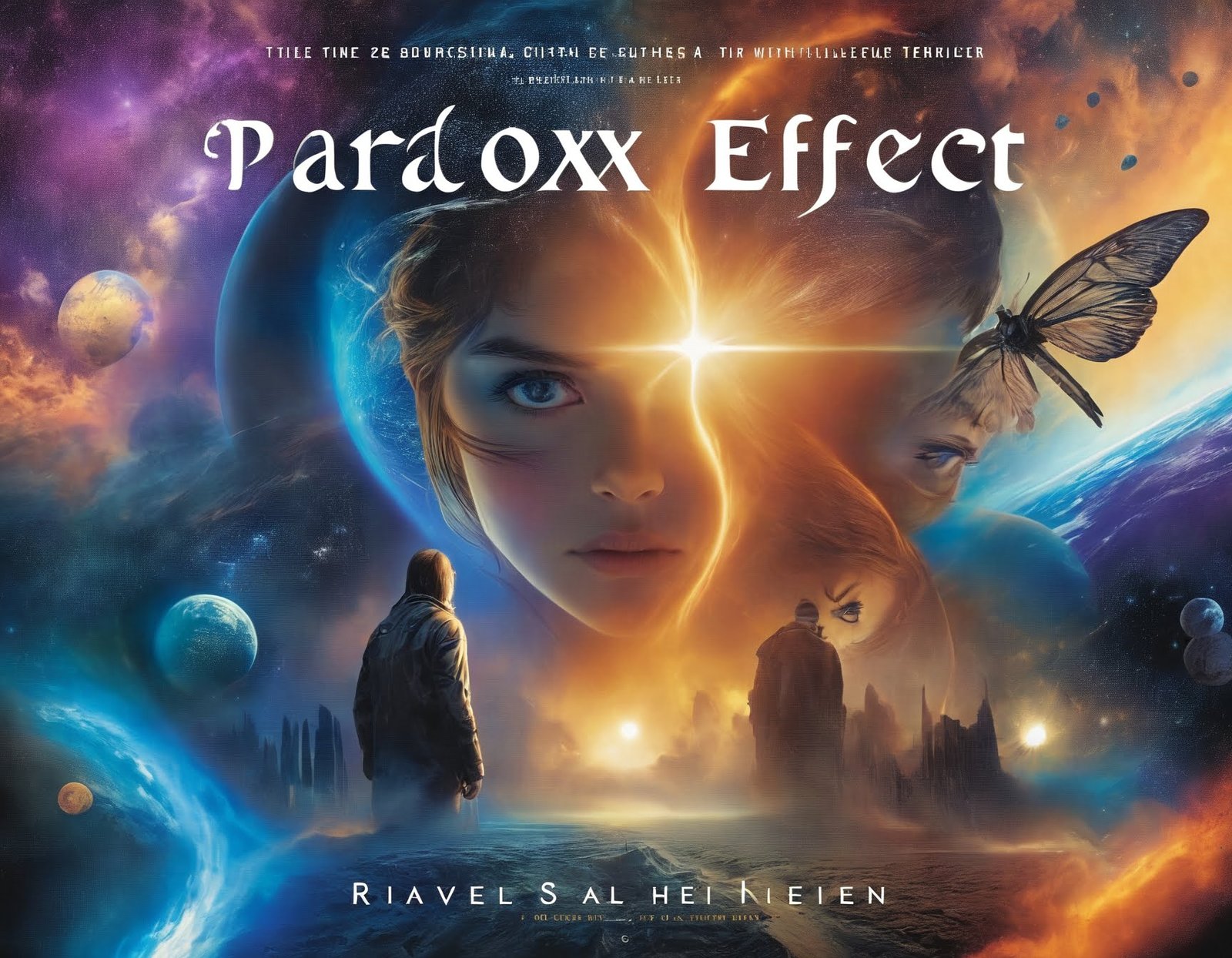Paradox Effect: Time Travel and Purified DNA Merge to Halt the Collapse of Human Existence is a compelling science fiction novel that takes readers on a thrilling journey through time, genetics, and the potential future of humanity. This review explores the novel’s key themes, plot intricacies, and the impact it has on the genre. With a narrative that merges complex scientific concepts with a gripping story, Paradox Effect challenges readers to think critically about the possibilities and perils of tampering with time and genetics.
Setting the Stage: A World on the Brink
The world of Paradox Effect exists on the edge of disaster. Humanity faces an existential crisis, brought about by a combination of environmental degradation, overpopulation, and the unintended consequences of technological advancements. The novel opens with a vivid portrayal of a future Earth that is struggling to sustain life. The atmosphere is thick with pollution, natural resources are nearly depleted, and the human race stands on the precipice of extinction.
This bleak setting provides the backdrop for the novel’s central conflict: the desperate attempt to save humanity from its own self-destruction. The narrative quickly establishes the urgency of the situation, drawing readers into a world where every decision could mean the difference between survival and annihilation.

The Science of Time Travel and DNA Purification
At the heart of Paradox Effect lies a fascinating blend of time travel and genetic engineering. The novel delves into the complexities of these scientific concepts, weaving them into the fabric of the story in a way that is both thought-provoking and believable.
Time travel in Paradox Effect is not just a plot device but a carefully constructed scientific process. The novel explores the theoretical underpinnings of time travel, drawing on concepts from quantum mechanics and relativity to create a system that feels both fantastical and grounded in real science. The characters use time travel as a tool to prevent the collapse of human civilization, but the process is fraught with dangers and paradoxes that add layers of tension to the story.
The purification of DNA is another central theme in the novel. With humanity on the brink of extinction, scientists in Paradox Effect turn to genetic engineering as a last-ditch effort to save the species. The novel explores the ethical and moral implications of manipulating human DNA, raising questions about what it means to be human and whether the ends justify the means. The idea of using purified DNA to create a “better” version of humanity is both intriguing and unsettling, forcing readers to confront their own beliefs about genetics and the future of human evolution.
Characters Driven by Desperation and Hope
The characters in Paradox Effect are shaped by the desperate circumstances in which they find themselves. Each one is motivated by a deep sense of urgency, driven to take extreme measures in the hope of saving humanity. This desperation creates a sense of immediacy that permeates the entire novel, keeping readers on edge as they follow the characters’ journeys.
Dr. Elara Davis, the protagonist, is a brilliant geneticist who becomes the linchpin in the effort to save humanity. Her knowledge of DNA and her understanding of time travel make her indispensable to the mission. However, Elara is also haunted by the ethical dilemmas her work presents. She grapples with the moral implications of her actions, questioning whether the pursuit of survival justifies the manipulation of human life on such a fundamental level.
Elara’s complexity as a character adds depth to the novel. She is not a one-dimensional hero but a flawed and conflicted individual who is trying to navigate an impossible situation. Her internal struggles mirror the larger questions the novel raises about the consequences of playing god with human genetics and the ripple effects of altering the past.
Supporting characters, such as the enigmatic time traveler Kael and the ruthless government official Markus, provide additional perspectives on the novel’s themes. Kael’s mysterious past and ambiguous motivations add an element of intrigue to the story, while Markus represents the darker side of humanity’s survival instinct. Together, these characters create a rich tapestry of personalities that drive the narrative forward.
Plot Intricacies and Twists
Paradox Effect is a novel that thrives on complexity. The plot is intricately woven, with multiple timelines, parallel universes, and a series of events that challenge the reader’s understanding of cause and effect. Roberts has crafted a narrative that requires careful attention, as the story frequently shifts between different points in time and explores the consequences of altering history.
The novel’s central plot revolves around the attempt to prevent humanity’s collapse by altering key moments in history. Elara and her team of scientists and time travelers embark on a mission to rewrite the past, using their knowledge of genetics and time travel to create a better future. However, their actions have unintended consequences, leading to a series of paradoxes that threaten to unravel the very fabric of reality.
The twists and turns in the plot keep readers guessing until the very end. Roberts masterfully balances the complexity of the story with a clear and engaging narrative, ensuring that even the most intricate plot points are accessible to readers. The tension builds steadily throughout the novel, culminating in a climactic finale that leaves readers questioning everything they thought they knew about the nature of time and existence.

Themes of Control, Consequence, and Humanity
Paradox Effect is a novel that explores profound themes of control, consequence, and the essence of humanity. The story raises important questions about the extent to which humans should exert control over nature and time, and the potential consequences of such actions.
Control is a central theme in the novel, both in terms of genetic manipulation and time travel. The characters seek to control their fate by altering the past and engineering a better future. However, the novel suggests that such control is illusory, as every action has unforeseen consequences. The idea that humans can control their destiny is challenged repeatedly throughout the story, as the characters confront the limits of their power.
The theme of consequence is closely tied to the novel’s exploration of control. Paradox Effect illustrates the butterfly effect, showing how small changes in the past can lead to significant and often unpredictable outcomes in the future. The characters’ attempts to manipulate time and genetics have far-reaching consequences, many of which are beyond their control. The novel serves as a cautionary tale about the dangers of tampering with forces that are not fully understood.
Humanity is another key theme in the novel, particularly the question of what it means to be human in a world where DNA can be purified and time can be altered. The characters in Paradox Effect grapple with the ethical implications of their actions, questioning whether the ends justify the means when it comes to the survival of the species. The novel invites readers to consider the moral complexities of genetic engineering and time travel, and to reflect on the nature of humanity in a world where science has the power to redefine what it means to be human.
Writing Style and Narrative Voice
Roberts’ writing style in Paradox Effect is both engaging and thought-provoking. She has a talent for blending complex scientific concepts with accessible language, making the novel both intellectually stimulating and enjoyable to read. The narrative voice is confident and clear, guiding readers through the intricacies of the plot without becoming bogged down in technical jargon.
The pacing of the novel is well-balanced, with moments of high tension interspersed with quieter, more reflective passages. Roberts allows the story to breathe, giving readers time to absorb the implications of the characters’ actions before plunging them back into the fast-paced narrative. The result is a novel that is both exciting and intellectually rewarding, with a narrative that keeps readers hooked from beginning to end.
Roberts also excels at creating vivid and memorable imagery. The descriptions of the future Earth, with its polluted skies and barren landscapes, are particularly striking, painting a vivid picture of a world on the brink of collapse. The scenes involving time travel and genetic manipulation are equally well-rendered, bringing the novel’s scientific concepts to life in a way that is both visually and emotionally impactful.

The Impact of Paradox Effect on the Science Fiction Genre
Paradox Effect is a significant contribution to the science fiction genre, offering a fresh take on familiar themes of time travel, genetic engineering, and the future of humanity. Roberts has crafted a novel that is both innovative and deeply rooted in the traditions of the genre, combining speculative science with a compelling narrative to create a story that resonates with readers.
The novel’s exploration of the ethical and moral implications of scientific advancement places it firmly in the tradition of classic science fiction, while its intricate plot and richly developed characters bring a modern sensibility to the genre. Paradox Effect challenges readers to think critically about the consequences of scientific progress and the potential dangers of playing god with time and genetics.
Roberts’ ability to blend scientific concepts with a gripping story sets Paradox Effect apart from other works in the genre. The novel is both intellectually stimulating and emotionally engaging, offering readers a thought-provoking exploration of the potential future of humanity. As such, Paradox Effect has the potential to become a classic in the science fiction genre, inspiring future generations of readers and writers alike.
Conclusion: Paradox Effect as a Must-Read Science Fiction Novel
In conclusion, Paradox Effect: Time Travel and Purified DNA Merge to Halt the Collapse of Human Existence by Lauren Roberts is a must-read for fans of science fiction. The novel’s intricate plot, complex characters, and exploration of profound themes make it a standout work in the genre. Roberts has crafted a story that is both thought-provoking and entertaining, offering readers a glimpse into a future that is as terrifying as it is fascinating.
Whether you are a longtime fan of science fiction or new to the genre, Paradox Effect is a novel that should not be missed. Its blend of time travel, genetic engineering, and philosophical inquiry
GET IT NOW





